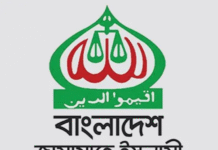Expert likens agreement to ‘slavery’ as lawmakers question how it came about

An Adani Power plant in India’s western state of Gujarat: The company is due to supply electricity to Bangladesh from a new facility under a controversial agreement. © Reuters
DHAKA — A controversy over a power purchase agreement between Bangladesh and India’s crisis-hit Adani Group is growing more heated, as Dhaka objects to the cost and critics cast suspicion on the deal.
The Bangladesh Power Development Board (BPDB) wants to amend a 2017 agreement to buy power from Adani’s new Godda plant, in the Indian state of Jharkhand. The plant is to start supplying electricity to Bangladesh soon, helping the cash-strapped country address some of the supply problems that have led to frequent blackouts. But the Bangladesh side has raised concerns about how much Adani intends to charge for coal to fuel the plant.
Moreover, Bangladeshi experts are increasingly slamming the arrangement as counter to the national interest, even likening it to “slavery.” In the past week, opposition parties in both India and Bangladesh have also raised uncomfortable questions about how Adani landed such deals in the first place.
“This is certainly not a smart deal, and it certainly needs to be reworked,” said economist Rehman Sobhan, chairman of the Centre for Policy Dialogue, at an event in Dhaka on Feb. 5. He called the pact with Adani Power “very peculiar.”
Officials at the BPDB have said the going price for coal is around $250 per tonne yet Adani wants to charge $400, a 60% premium. This revealed that the deal does not set an upper limit on the coal price, nor does it stipulate discounts for bulk, long-term purchases.
BPDB officials recently sought to lower the power price, and amend other provisions that allow Adani to charge more for coal.
A spokesperson for Adani Power told Nikkei Asia that the “BPDB has written to us to consider discounting the variable energy costs on a temporary basis, given the current high thermal seaborne coal prices, which is under consideration.” The representative, however, denied receiving a request to change the agreement itself.
Likewise, in a stock market clarification published Feb. 6, Adani Power acknowledged receiving a request to consider a discount on the energy charges, but added that “no [power purchase agreement] amendment is under consideration.”
Bangladesh’s junior power minister, Nasrul Hamid, insisted on Feb. 5 that “we will get coal at competitive prices.” He said the electricity would start flowing in March, as the commercial operation date of the power plant is set for later this month.
Bangladesh is eager to enhance its power generating capacity by building plants, including a Russian-backed nuclear power station, as well as importing electricity from neighboring countries, including India, Nepal and Bhutan. But critics say this has led to some opaque practices.
In 2010, the government enacted the Quick Enhancement of Electricity and Energy Supply (Special Provision) Act, which permits the government to push forward any power project without a tender process. The act also protects officials from prosecution for awarding unsolicited contracts.
The government has thus awarded contracts for a number of power projects without soliciting local or international tenders, negotiated tariffs with companies on its own, and spent billions. The deal with Adani Power was signed based on an unsolicited proposal and the tariffs on electricity and coal were set without much public debate.
Now, as billionaire Gautam Adani’s empire fights allegations of “brazen accounting fraud, stock manipulation and money laundering” leveled by U.S. short seller Hindenburg Research, opposition lawmakers in the parliaments of both India and Bangladesh have taken aim at the agreement.
Rahul Gandhi, a leader of the Indian National Congress party, attempted to link Modi’s Bharatiya Janata Party government to Adani and the BPDB deal and others.
“PM Modi goes to Australia and by magic, SBI gives [a] $1 billion loan to Adani,” the Times of India quoted Gandhi as saying in parliament on Tuesday, referring to a State Bank of India loan for an Australian mining project. “Then he goes to Bangladesh, and then the Bangladesh Power Development Board signs a 25-year contract with Adani.”
The same day, in the Bangladeshi parliament, the opposition Jatiya Party questioned why electricity was being purchased from Adani Group at elevated prices. Lawmaker Mujibul Haque Chunnu demanded a reexamination of the deal as the electricity tariff from Adani Power is 24.10 U.S. cents per kilowatt-hour versus 13.37 cents at Bangladesh’s Payra power plant and 18.39 cents at an S. Alam station in Chattogram.
Some experts say the agreement is fundamentally flawed. Mohammad Tamim, a professor of petroleum and mineral resources engineering at Bangladesh University of Engineering and Technology, said the coal price is based on the Newcastle spot price, and that this “is something we should not have agreed at the beginning.”
“Power plants only buy coal from there to meet emergency needs, and they all have long-term coal deals,” he said. “Long-term contracts are always discounted, by up to 55%.” Tamim said the price for the Payra plant is up to $220 per tonne, well below what Adani is apparently seeking.
Still, he conceded that as Adani will have to transport coal by train, as well as cover electricity transmission costs, “Adani’s price is always going to be higher.” He said Bangladesh also benefits from leaving operational and pollution hassles to Adani.
“If Adani’s tariff gap is 1 U.S. cent [above] other plants, I think it’s OK,” he said. “But if the difference is further up, that is absolutely not acceptable.”
B.D. Rahmatullah, former director general of industry regulator Power Cell, said that since this is a matter of cross-border transmission, the energy authorities of both countries should have set the tariff. “Adani unilaterally offered a tariff and BPDB accepted it sans technical discussion,” he said.
He said that in the agreement, the fuel price was written as “pass-through,” meaning that coal expenses will rise or fall based on international rates. “Now we are under the mercy of Adani Group to get the coal price lowered. It’s a slavery deal,” he said.
Rahmatullah argued that there was political influence involved. “Adani is the BJP’s closest friend and Bangladesh could not deny the proposal to make Narendra Modi pleased,” he said, without offering proof of such ties.
Alleged links between Adani and Modi’s government are a sensitive subject in India. Ministers have denied the government has anything to do with the crisis, and Gandhi’s comments in parliament were expunged from the official record.
Mohammad Tanzimuddin Khan, a professor of international relations at the University of Dhaka, agreed that such deals have a “political-economic aspect.”
“Staying with such companies means keeping government alongside and getting their support,” he said without elaborating. But Khan said the hasty agreement has left Bangladesh citizens facing a heavy burden. “We are signing such uneven deals using the [Quick Enhancement of Electricity Act] as a shield.”










